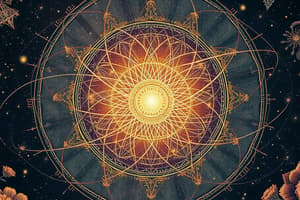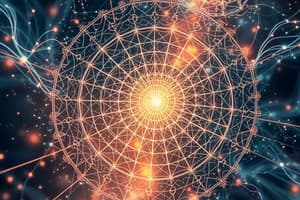Podcast
Questions and Answers
Who proposed the principle of wave-particle duality?
Who proposed the principle of wave-particle duality?
- Max Planck
- Louis de Broglie (correct)
- Albert Einstein
- Niels Bohr
Who theorized that radiation itself was quantized?
Who theorized that radiation itself was quantized?
- Niels Bohr
- Albert Einstein (correct)
- Max Planck
- Louis de Broglie
What did Max Planck assume energy was made of?
What did Max Planck assume energy was made of?
- Quantum units (correct)
- Continuous spectrum
- Particles and waves
- Subatomic particles
What is the theoretical basis of modern physics that explains the nature and behavior of matter and energy on the atomic and subatomic level?
What is the theoretical basis of modern physics that explains the nature and behavior of matter and energy on the atomic and subatomic level?
"Quantum physics" and "quantum mechanics" refer to the nature and behavior of matter and energy at which level?
"Quantum physics" and "quantum mechanics" refer to the nature and behavior of matter and energy at which level?
Flashcards are hidden until you start studying
Study Notes
Wave-Particle Duality
- Proposed by Albert Einstein, wave-particle duality suggests that particles, like electrons, exhibit both wave-like and particle-like properties.
Quantization of Radiation
- Max Planck theorized that electromagnetic radiation is quantized, introducing the concept that energy is emitted or absorbed in discrete units called "quanta."
Energy Composition
- Max Planck assumed energy was made of small, indivisible packets known as "quanta," leading to the foundation of quantum theory.
Theoretical Basis of Modern Physics
- Quantum mechanics is the theoretical framework explaining the nature and behavior of matter and energy at atomic and subatomic levels.
Level of Matter and Energy
- "Quantum physics" and "quantum mechanics" specifically refer to phenomena occurring at the atomic and subatomic levels, challenging classical physics understanding.
Studying That Suits You
Use AI to generate personalized quizzes and flashcards to suit your learning preferences.




